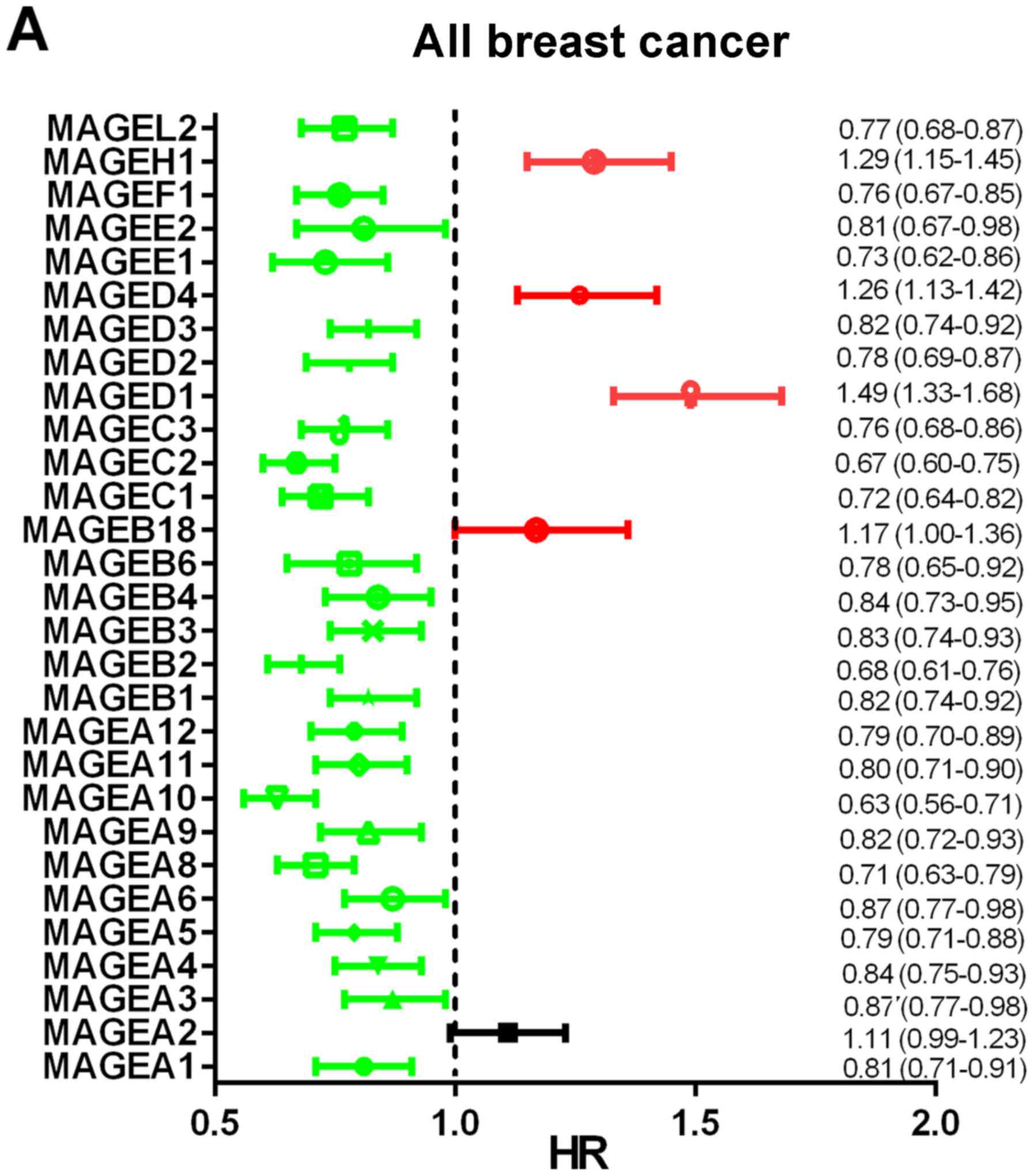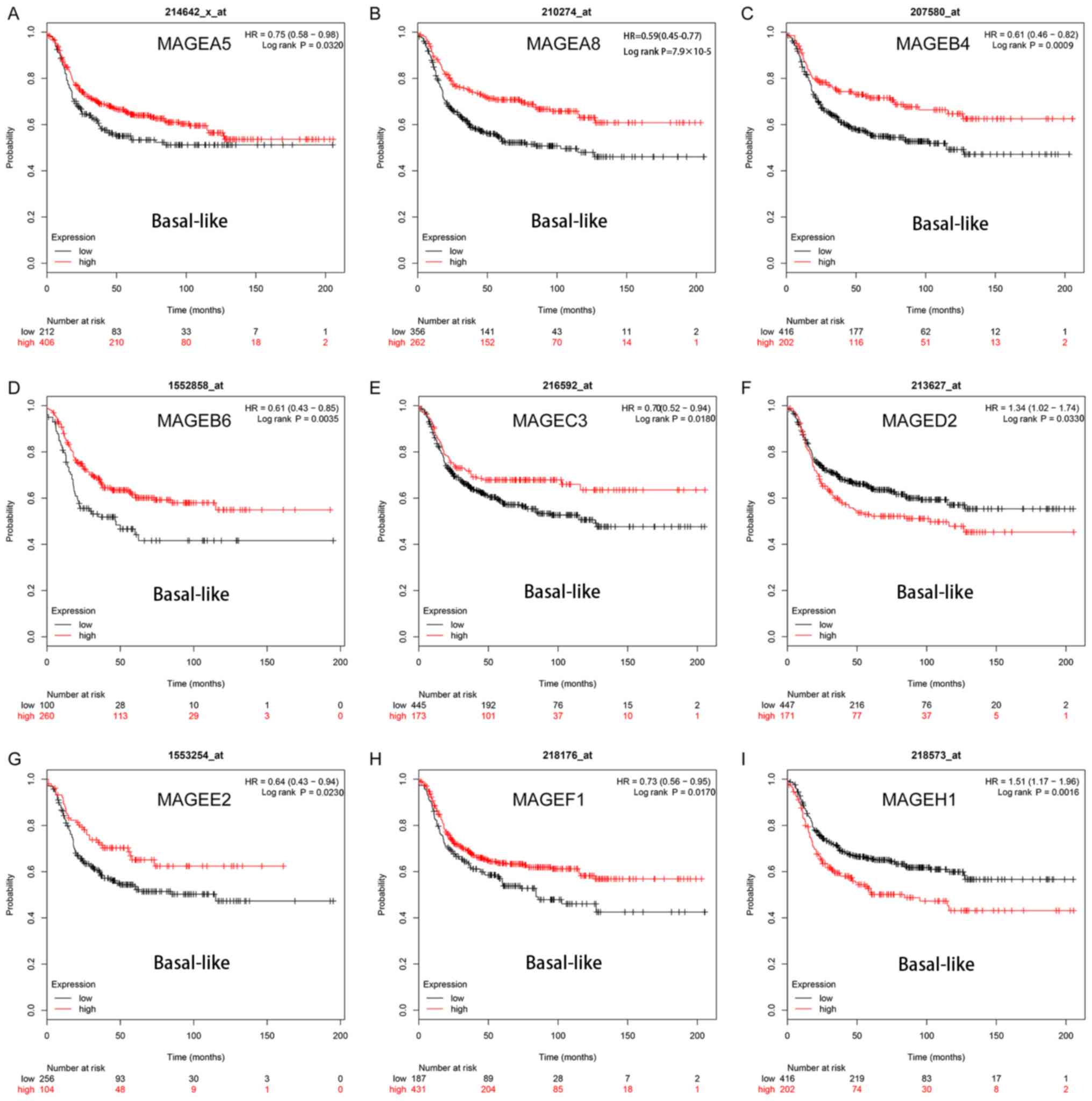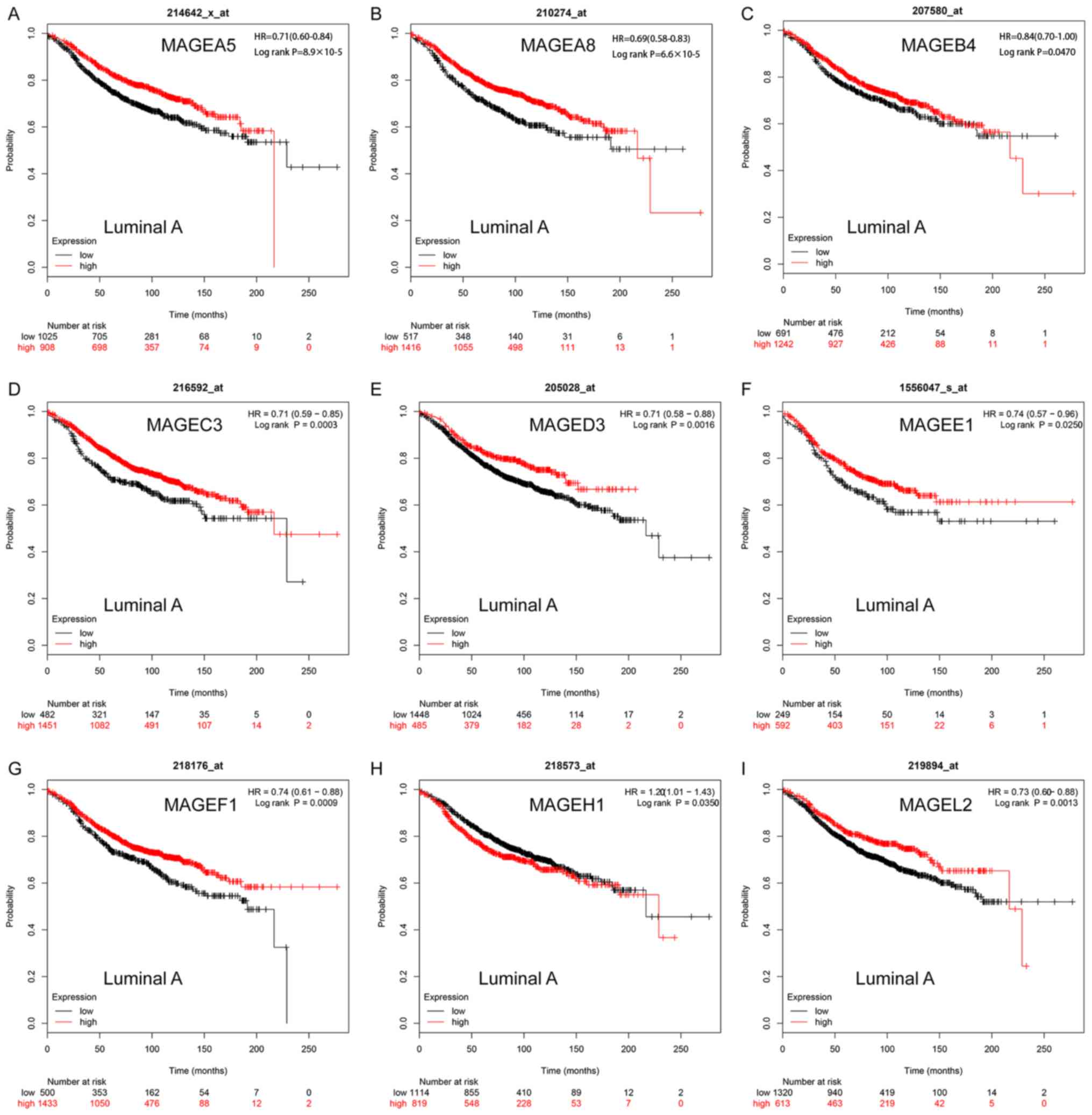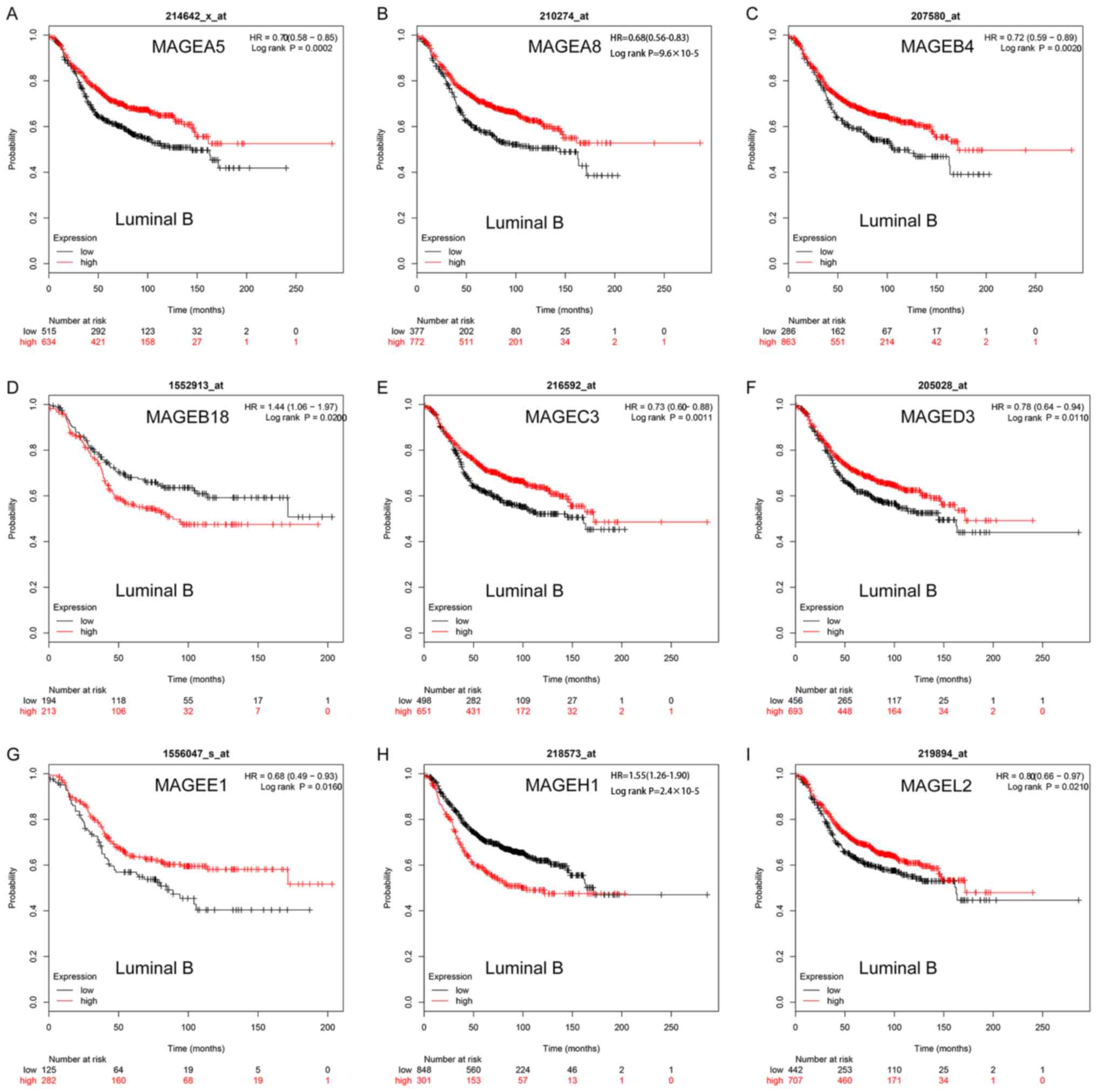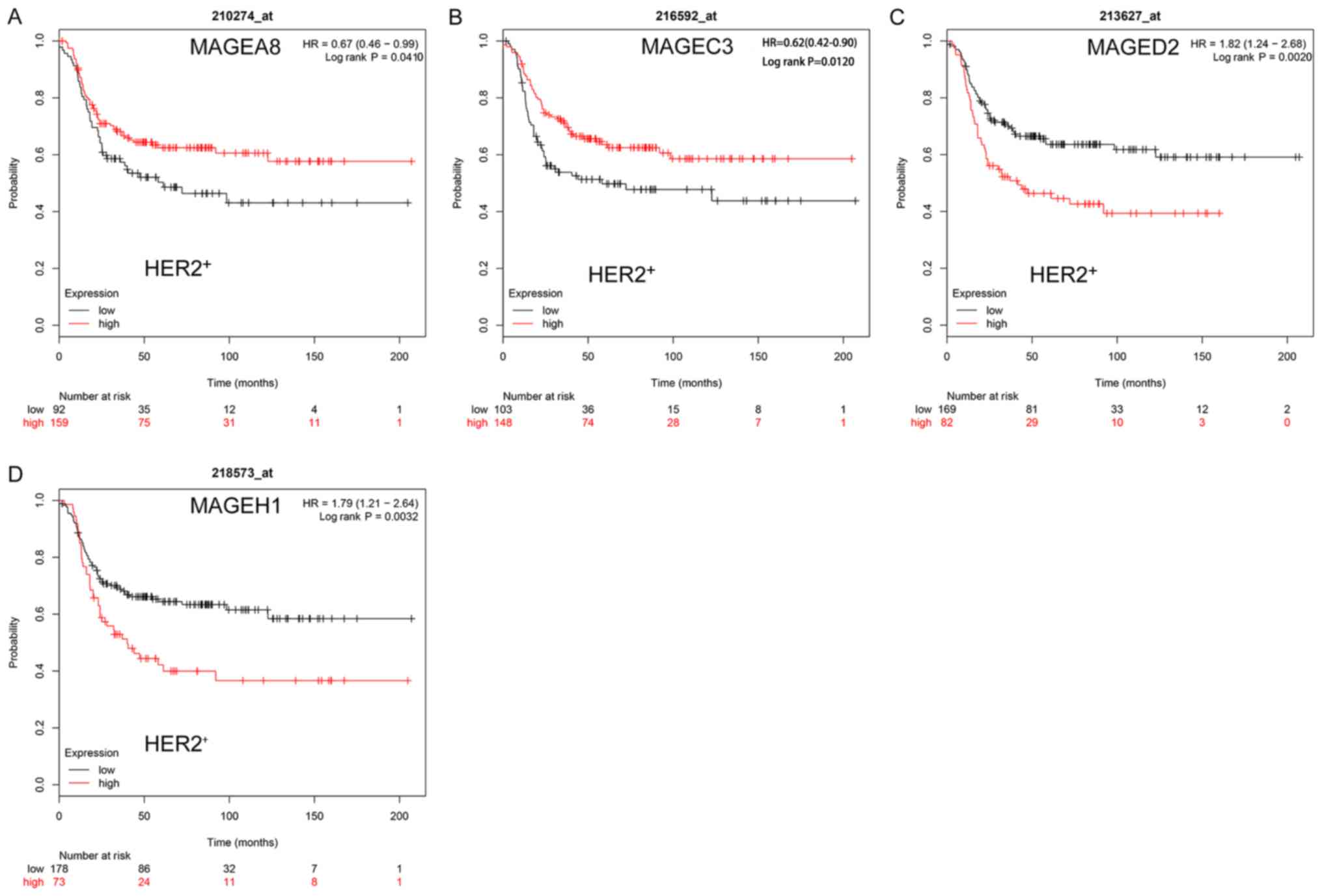|
1
|
Mansoori B, Mohammadi A, Ghasabi M,
Shirjang S, Dehghan R, Montazeri V, Holmskov U, Kazemi T, Duijf P,
Gjerstorff M and Baradaran B: miR-142-3p as tumor suppressor miRNA
in the regulation of tumorigenicity, invasion and migration of
human breast cancer by targeting Bach-1 expression. J Cell Physiol.
234:9816–9825. 2019. View Article : Google Scholar : PubMed/NCBI
|
|
2
|
Cheng CW, Yu JC, Hsieh YH, Liao WL, Shieh
JC, Yao CC, Lee HJ, Chen PM, Wu PE and Shen CY: Increased cellular
levels of MicroRNA-9 and MicroRNA-221 correlate with cancer
stemness and predict poor outcome in human breast cancer. Cell
Physiol Biochem. 48:2205–2218. 2018. View Article : Google Scholar : PubMed/NCBI
|
|
3
|
Zhao L, Zhao Y, He Y, Li Q and Mao Y: The
functional pathway analysis and clinical significance of miR-20a
and its related lncRNAs in breast cancer. Cell Signal. 51:152–165.
2018. View Article : Google Scholar : PubMed/NCBI
|
|
4
|
Siegel RL, Miller KD and Jemal A: Cancer
statistics, 2018. CA Cancer J Clin. 68:7–30. 2018. View Article : Google Scholar : PubMed/NCBI
|
|
5
|
Shen J, Cao B, Wang Y, Ma C, Zeng Z, Liu
L, Li X, Tao D, Gong J and Xie D: Hippo component YAP promotes
focal adhesion and tumour aggressiveness via transcriptionally
activating THBS1/FAK signalling in breast cancer. J Exp Clin Cancer
Res. 37:1752018. View Article : Google Scholar : PubMed/NCBI
|
|
6
|
Jungbluth AA, Ely S, DiLiberto M,
Niesvizky R, Williamson B, Frosina D, Chen YT, Bhardwaj N,
Chen-Kiang S, Old LJ and Cho HJ: The cancer-testis antigens CT7
(MAGE-C1) and MAGE-A3/6 are commonly expressed in multiple myeloma
and correlate with plasma-cell proliferation. Blood. 106:167–174.
2005. View Article : Google Scholar : PubMed/NCBI
|
|
7
|
Sienel W, Varwerk C, Linder A, Kaiser D,
Teschner M, Delire M, Stamatis G and Passlick B: Melanoma
associated antigen (MAGE)-A3 expression in Stages I and II
non-small cell lung cancer: Results of a multi-center study. Eur J
Cardiothorac Surg. 25:131–134. 2004. View Article : Google Scholar : PubMed/NCBI
|
|
8
|
Weiser TS, Ohnmacht GA, Guo ZS, Fischette
MR, Chen GA, Hong JA, Nguyen DM and Schrump DS: Induction of MAGE-3
expression in lung and esophageal cancer cells. Ann Thorac Surg.
71:295–302. 2001. View Article : Google Scholar : PubMed/NCBI
|
|
9
|
Bergeron A, Picard V, LaRue H, Harel F,
Hovington H, Lacombe L and Fradet Y: High frequency of MAGE-A4 and
MAGE-A9 expression in high-risk bladder cancer. Int J Cancer.
125:1365–1371. 2009. View Article : Google Scholar : PubMed/NCBI
|
|
10
|
Otte M, Zafrakas M, Riethdorf L,
Pichlmeier U, Löning T, Jänicke F and Pantel K: MAGE-A gene
expression pattern in primary breast cancer. Cancer Res.
61:6682–6687. 2001.PubMed/NCBI
|
|
11
|
Simpson AJ, Caballero OL, Jungbluth A,
Chen YT and Old LJ: Cancer/testis antigens, gametogenesis and
cancer. Nat Rev Cancer. 5:615–625. 2005. View Article : Google Scholar : PubMed/NCBI
|
|
12
|
Chomez P, De Backer O, Bertrand M, De
Plaen E, Boon T and Lucas S: An overview of the MAGE gene family
with the identification of all human members of the family. Cancer
Res. 61:5544–5551. 2001.PubMed/NCBI
|
|
13
|
Espantman KC and O'Shea CC: aMAGEing new
players enter the RING to promote ubiquitylation. Mol Cell.
39:835–837. 2010. View Article : Google Scholar : PubMed/NCBI
|
|
14
|
Zhao J, Wang Y, Mu C, Xu Y and Sang J:
MAGEA1 interacts with FBXW7 and regulates ubiquitin ligase-mediated
turnover of NICD1 in breast and ovarian cancer cells. Oncogene.
36:5023–5034. 2017. View Article : Google Scholar : PubMed/NCBI
|
|
15
|
Joosse SA, Müller V, Steinbach B, Pantel K
and Schwarzenbach H: Circulating cell-free cancer-testis MAGE-A
RNA, BORIS RNA, let-7b and miR-202 in the blood of patients with
breast cancer and benign breast diseases. Br J Cancer. 111:909–917.
2014. View Article : Google Scholar : PubMed/NCBI
|
|
16
|
Ayyoub M, Scarlata CM, Hamaï A, Pignon P
and Valmori D: Expression of MAGE-A3/6 in primary breast cancer is
associated with hormone receptor negative status, high histologic
grade, and poor survival. J Immunother. 37:73–76. 2014. View Article : Google Scholar : PubMed/NCBI
|
|
17
|
Cabezon T, Gromova I, Gromov P, Serizawa
R, Timmermans Wielenga V, Kroman N, Celis JE and Moreira JM:
Proteomic profiling of triple-negative breast carcinomas in
combination with a three-tier orthogonal technology approach
identifies Mage-A4 as potential therapeutic target in estrogen
receptor negative breast cancer. Mol Cell Proteomics. 12:381–394.
2013. View Article : Google Scholar : PubMed/NCBI
|
|
18
|
Hussein YM, Gharib AF, Etewa RL, El-Shal
AS, Abdel-Ghany ME and Elsawy WH: The melanoma-associated
antigen-A3, -A4 genes: relation to the risk and clinicopathological
parameters in breast cancer patients. Mol Cell Biochem.
351:261–268. 2011. View Article : Google Scholar : PubMed/NCBI
|
|
19
|
Lian Y, Sang M, Ding C, Zhou X, Fan X, Xu
Y, Lü W and Shan B: Expressions of MAGE-A10 and MAGE-A11 in breast
cancers and their prognostic significance: A retrospective clinical
study. J Cancer Res Clin Oncol. 138:519–527. 2012. View Article : Google Scholar : PubMed/NCBI
|
|
20
|
Xu X, Tang X, Lu M, Tang Q, Zhang H, Zhu
H, Xu N, Zhang D, Xiong L, Mao Y and Zhu J: Overexpression of
MAGE-A9 predicts unfavorable outcome in breast cancer. Exp Mol
Pathol. 97:579–584. 2014. View Article : Google Scholar : PubMed/NCBI
|
|
21
|
Hou SY, Sang MX, Geng CZ, Liu WH, Lü WH,
Xu YY and Shan BE: Expressions of MAGE-A9 and MAGE-A11 in breast
cancer and their expression mechanism. Arch Med Res. 45:44–51.
2014. View Article : Google Scholar : PubMed/NCBI
|
|
22
|
Badovinac Crnjevic T, Spagnoli G, Juretić
A, Jakić-Razumović J, Podolski P and Šarić N: High expression of
MAGE-A10 cancer-testis antigen in triple-negative breast cancer.
Med Oncol. 29:1586–1891. 2012. View Article : Google Scholar : PubMed/NCBI
|
|
23
|
Xia LP, Xu M, Chen Y and Shao WW:
Expression of MAGE-A11 in breast cancer tissues and its effects on
the proliferation of breast cancer cells. Mol Med Rep. 7:254–258.
2013. View Article : Google Scholar : PubMed/NCBI
|
|
24
|
Sypniewska RK, Hoflack L, Tarango M,
Gauntt S, Leal BZ, Reddick RL and Gravekamp C: Prevention of
metastases with a Mage-b DNA vaccine in a mouse breast tumor model:
potential for breast cancer therapy. Breast Cancer Res Treat.
91:19–28. 2005. View Article : Google Scholar : PubMed/NCBI
|
|
25
|
Sypniewska RK, Hoflack L, Bearss DJ and
Gravekamp C: Potential mouse tumor model for pre-clinical testing
of mage-specific breast cancer vaccines. Breast Cancer Res Treat.
74:221–233. 2002. View Article : Google Scholar : PubMed/NCBI
|
|
26
|
Hou S, Sang M, Zhao L, Hou R and Shan B:
The expression of MAGE-C1 and MAGE-C2 in breast cancer and their
clinical significance. Am J Surg. 211:142–151. 2016. View Article : Google Scholar : PubMed/NCBI
|
|
27
|
Du Q, Zhang Y, Tian XX, Li Y and Fang WG:
MAGE-D1 inhibits proliferation, migration and invasion of human
breast cancer cells. Oncol Rep. 22:659–665. 2009.PubMed/NCBI
|
|
28
|
Gyorffy B, Lanczky A, Eklund AC, Denkert
C, Budczies J, Li Q and Szallasi Z: An online survival analysis
tool to rapidly assess the effect of 22,277 genes on breast cancer
prognosis using microarray data of 1,809 patients. Breast Cancer
Res Treat. 123:725–731. 2010. View Article : Google Scholar : PubMed/NCBI
|
|
29
|
Bertero L, Massa F, Metovic J, Zanetti R,
Castellano I, Ricardi U, Papotti M and Cassoni P: Eighth Edition of
the UICC Classification of Malignant Tumours: An overview of the
changes in the pathological TNM classification criteria-What has
changed and why? Virchows Arch. 472:519–531. 2018. View Article : Google Scholar : PubMed/NCBI
|
|
30
|
Haffty BG, Yang Q, Reiss M, Kearney T,
Higgins SA, Weidhaas J, Harris L, Hait W and Toppmeyer D:
Locoregional relapse and distant metastasis in conservatively
managed triple negative early-stage breast cancer. J Clin Oncol.
24:5652–5657. 2006. View Article : Google Scholar : PubMed/NCBI
|
|
31
|
Campagnolo C, Meyers KJ, Ryan T, Atkinson
RC, Chen YT, Scanlan MJ, Ritter G, Old LJ and Batt CA: Real-Time,
label-free monitoring of tumor antigen and serum antibody
interactions. J Biochem Biophys Methods. 61:283–298. 2004.
View Article : Google Scholar : PubMed/NCBI
|
|
32
|
Krishnadas DK, Bai F and Lucas KG: Cancer
testis antigen and immunotherapy. Immunotargets Ther. 2:11–19.
2013. View Article : Google Scholar : PubMed/NCBI
|
|
33
|
Weon JL and Potts PR: The MAGE protein
family and cancer. Curr Opin Cell Biol. 37:1–8. 2015. View Article : Google Scholar : PubMed/NCBI
|
|
34
|
Raghavendra A, Kalita-de Croft P, Vargas
AC, Smart CE, Simpson PT, Saunus JM and Lakhani SR: Expression of
MAGE-A and NY-ESO-1 cancer/testis antigens is enriched in
triple-negative invasive breast cancers. Histopathology. 73:68–80.
2018. View Article : Google Scholar : PubMed/NCBI
|
|
35
|
Park S, Sung Y, Jeong J, Choi M, Lee J,
Kwon W, Jang S, Park SJ, Kim HS, Lee MH, et al: hMAGEA2 promotes
progression of breast cancer by regulating Akt and Erk1/2 pathways.
Oncotarget. 8:37115–37127. 2017.PubMed/NCBI
|
|
36
|
Taylor M, Bolton LM, Johnson P, Elliott T
and Murray N: Breast cancer is a promising target for vaccination
using cancer-testis antigens known to elicit immune responses.
Breast Cancer Res. 9:R462007. View Article : Google Scholar : PubMed/NCBI
|
|
37
|
Abd-Elsalam EA and Ismaeil NA:
Melanoma-associated antigen genes: A new trend to predict the
prognosis of breast cancer patients. Med Oncol. 31:2852014.
View Article : Google Scholar : PubMed/NCBI
|
|
38
|
Castro F, Leal B, Denny A, Bahar R,
Lampkin S, Reddick R, Lu S and Gravekamp C: Vaccination with Mage-b
DNA induces CD8 T-cell responses at young but not old age in mice
with metastatic breast cancer. Br J Cancer. 101:1329–1337. 2009.
View Article : Google Scholar : PubMed/NCBI
|
|
39
|
Afsharpad M, Nowroozi MR, Ayati M, Saffari
M, Nemati S, Mohebbi E, Nekoohesh L, Zendehdel K and Modarressi MH:
ODF4, MAGEA3, and MAGEB4: Potential biomarkers in patients with
transitional cell carcinoma. Iran Biomed J. 22:160–170.
2018.PubMed/NCBI
|
|
40
|
Osterlund C, Töhönen V, Forslund KO and
Nordqvist K: Mage-b4, a novel melanoma antigen (MAGE) gene
specifically expressed during germ cell differentiation. Cancer
Res. 60:1054–1061. 2000.PubMed/NCBI
|
|
41
|
Zamunér FT, Karia BT, de Oliveira CZ,
Santos CR, Carvalho AL and Vettore AL: A comprehensive expression
analysis of cancer testis antigens in head and neck squamous cell
carcinoma revels MAGEA3/6 as a marker for recurrence. Mol Cancer
Ther. 14:828–834. 2015. View Article : Google Scholar : PubMed/NCBI
|
|
42
|
Lin Y, Wen T, Meng X, Wu Z, Zhao L, Wang
P, Hong Z and Yin Z: The mouse Mageb18 gene encodes a ubiquitously
expressed type I MAGE protein and regulates cell proliferation and
apoptosis in melanoma B16-F0 cells. Biochem J. 443:779–788. 2012.
View Article : Google Scholar : PubMed/NCBI
|
|
43
|
Eng KH, Szender JB, Etter JL, Kaur J,
Poblete S, Huang RY, Zhu Q, Grzesik KA, Battaglia S, Cannioto R, et
al: Paternal lineage early onset hereditary ovarian cancers: A
Familial Ovarian Cancer Registry study. PLoS Genet.
14:e10071942018. View Article : Google Scholar : PubMed/NCBI
|
|
44
|
Bao L, Qian Z, Lyng MB, Wang L, Yu Y, Wang
T, Zhang X, Yang H, Brünner N, Wang J and Ditzel HJ: Coexisting
genomic aberrations associated with lymph node metastasis in breast
cancer. J Clin Invest. 128:2310–2324. 2018. View Article : Google Scholar : PubMed/NCBI
|
|
45
|
Kömhoff M and Laghmani K: MAGED2: A novel
form of antenatal Bartter's syndrome. Curr Opin Nephrol Hypertens.
27:323–328. 2018. View Article : Google Scholar : PubMed/NCBI
|
|
46
|
Hashimoto R, Kanda M, Takami H, Shimizu D,
Oya H, Hibino S, Okamura Y, Yamada S, Fujii T, Nakayama G, et al:
Aberrant expression of melanoma-associated antigen-D2 serves as a
prognostic indicator of hepatocellular carcinoma outcome following
curative hepatectomy. Oncol Lett. 9:1201–1206. 2015. View Article : Google Scholar : PubMed/NCBI
|
|
47
|
Zhang QM, Shen N, Xie S, Bi SQ, Luo B, Lin
YD, Fu J, Zhou SF, Luo GR, Xie XX and Xiao SW: MAGED4 expression in
glioma and upregulation in glioma cell lines with
5-aza-2′-deoxycytidine treatment. Asian Pac J Cancer Prev.
15:3495–3501. 2014. View Article : Google Scholar : PubMed/NCBI
|
|
48
|
Ma QY, Pang LW, Chen ZM, Zhu YJ, Chen G
and Chen J: The significance of MAGED4 expression in non-small cell
lung cancer as analyzed by real-time fluorescence quantitative PCR.
Oncol Lett. 4:733–738. 2012. View Article : Google Scholar : PubMed/NCBI
|
|
49
|
Leung YK, Govindarajah V, Cheong A,
Veevers J, Song D, Gear R, Zhu X, Ying J, Kendler A, Medvedovic M,
et al: Gestational high-fat diet and bisphenol A exposure heightens
mammary cancer risk. Endocr Relat Cancer. 24:365–378. 2017.
View Article : Google Scholar : PubMed/NCBI
|
|
50
|
Stone B, Schummer M, Paley PJ, Crawford M,
Ford M, Urban N and Nelson BH: MAGE-F1, a novel ubiquitously
expressed member of the MAGE superfamily. Gene. 267:173–182. 2001.
View Article : Google Scholar : PubMed/NCBI
|
|
51
|
Wang PC, Hu ZQ, Zhou SL, Zhan H, Zhou ZJ,
Luo CB and Huang XW: Downregulation of MAGE family member H1
enhances hepatocellular carcinoma progression and serves as a
biomarker for patient prognosis. Future Oncol. 14:1177–1186. 2018.
View Article : Google Scholar : PubMed/NCBI
|
|
52
|
Ojima H, Yoshikawa D, Ino Y, Shimizu H,
Miyamoto M, Kokubu A, Hiraoka N, Morofuji N, Kondo T, Onaya H, et
al: Establishment of six new human biliary tract carcinoma cell
lines and identification of MAGEH1 as a candidate biomarker for
predicting the efficacy of gemcitabine treatment. Cancer Sci.
101:882–888. 2010. View Article : Google Scholar : PubMed/NCBI
|















